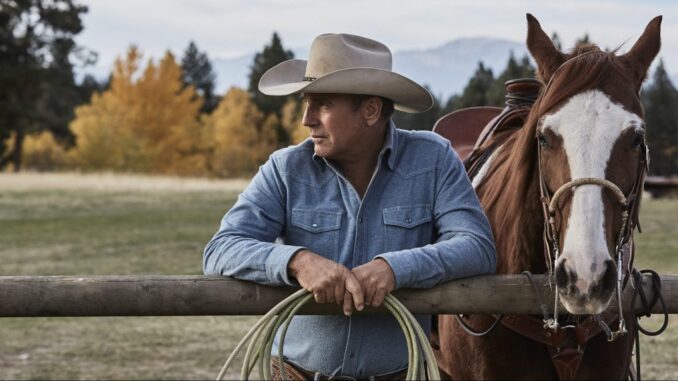
Yellowstone 2025: The Ash and the Seed
The crisp Montana air of 2025 no longer carries the heavy scent of Dutton certainty. Instead, it whispers of change, a subtle shift that has slowly, inexorably, eroded the foundations of an empire once believed to be as eternal as the mountains themselves. The Yellowstone Dutton Ranch, that sprawling, blood-soaked testament to stubborn pride and inherited legacy, stands now as a skeleton of ambition, its vastness echoing with the ghosts of past battles and the quiet finality of an era’s end.
The Dutton Empire, by this year, has not so much crashed in a fiery spectacle as it has dissolved, molecule by molecule, under the weight of its own unsustainable grandeur. Perhaps it was the internecine warfare, the constant self-cannibalization that left too few standing to truly fight. Perhaps it was the relentless march of modernity, the urban sprawl and corporate greed that finally, after generations, managed to outmaneuver the antiquated, violent code of the ranch. Or perhaps, most poetically, it was the land itself, finally shrugging off the heavy hand of its human custodians, reclaiming its wild, untamed essence.
We can imagine the scene: not a dramatic shootout in the bunkhouse, but a series of legal defeats, a crushing tax burden, a lack of heirs willing or capable of bearing the immense, bloody weight of the brand. The patriarch, John Dutton, if he still breathes, is a figure reduced, perhaps watching from a nursing home window as the cattle are sold off, parcel by parcel. Beth and Jamie, their toxic dance finally concluded, may have destroyed each other, leaving only ashes where their rivalry once raged. Kayce and Monica, if they endured, likely sought a quieter, more indigenous-rooted existence, far from the white-man’s burden of the ranch. The iconic “Y” brand, once a symbol of defiant ownership, becomes a faded memory, a legend recounted with a mixture of awe and pity. The lodge, once thrumming with tension and simmering violence, stands hollow, dust motes dancing in sunbeams through empty windows, a museum piece awaiting its true dissolution. The land, once fiercely guarded, is now either an ecological trust, a vast national park expansion, or perhaps, most ironically, carved into luxury subdivisions by the very forces the Duttons fought so hard to repel. The empire ends not with a bang, but with the quiet hum of bulldozers, the whisper of legal documents, and the profound silence of a legacy concluded.
But the end of one story, especially in the hands of a master storyteller like Taylor Sheridan, is merely the genesis of another. The very vacuum left by the collapse of the Dutton Empire creates a fertile ground for new narratives, new struggles, and new definitions of the American West. Enter “Spin-off md07,” not merely a continuation, but a deliberate evolution, a recognition that while the Duttons were a powerful, albeit flawed, myth, the universe they inhabited is infinitely larger and more complex.
“Spin-off md07” does not dwell on the ghosts of the Duttons, though their legend might serve as a cautionary tale whispered around new campfires. Instead, it shifts the lens, perhaps focusing on the rise of the Broken Rock Reservation, finally asserting its sovereignty and stewardship over ancestral lands, grappling with the complexities of economic development versus cultural preservation. We might see a new generation of leaders, indigenous and diverse, navigating the treacherous waters of modern politics, ecological crises, and the enduring pull of tradition.
Or, “md07” could delve into a completely different facet of the modern frontier – the lives of the ranch hands and cowboys who, unlike the Duttons, truly loved the land and the lifestyle without the burden of empire. It could explore their struggles to adapt, to find purpose in a world where the large, dynastic ranches are fading. It might follow a family of small ranchers, fighting to keep their modest heritage alive against the same forces that swallowed the Duttons, but with different strategies and a more nuanced understanding of compromise.
Sheridan’s genius lies in his ability to weave a tapestry of American myths – the cowboy, the lawman, the frontiersman – and then expose their raw, often brutal, realities. With “md07,” he has the opportunity to shed the specific generational curse of the Duttons and explore the broader themes that resonate across his entire body of work: loyalty, violence, the cost of power, the fragility of justice, and the enduring, almost spiritual, connection to the land.
The future of Sheridan’s spin-offs is not about replicating the Duttons, but about understanding what made them compelling and then applying that essence to new characters, new conflicts, and new landscapes, both physical and emotional. The violence might be less about protecting an inherited brand and more about protecting community, water rights, or environmental sanctity. The moral ambiguities might shift from familial duty to systemic injustice. The heroism might be found not in clinging to the past, but in forging a sustainable future.
Yellowstone 2025 marks not just an end, but a necessary turning of the soil. The ash of the Dutton Empire nourishes the ground for “Spin-off md07” and beyond. It’s a testament to Sheridan’s vision that even as his most iconic creation fades, the universe he built remains vibrant, ready to blossom anew, proving that the spirit of the American West – its wildness, its struggles, its enduring allure – is not confined to one family or one ranch, but pulses through the very heart of the continent, ever-ready for its next epic tale. The land, after all, always endures, and so too, it seems, will the stories born from its vast, untamed heart.
